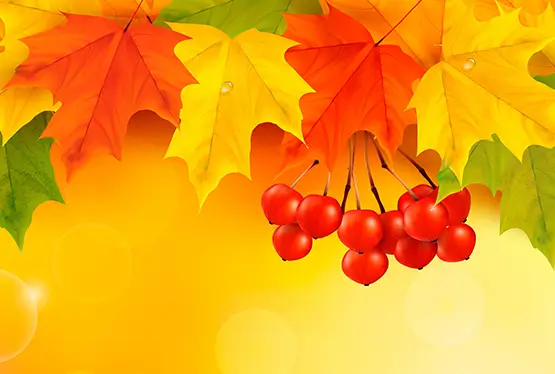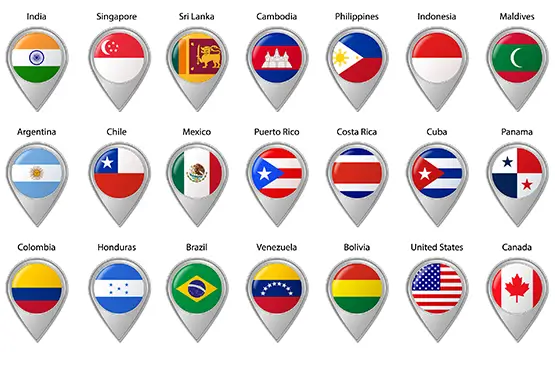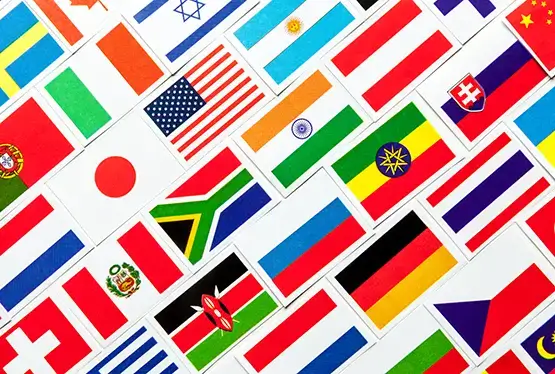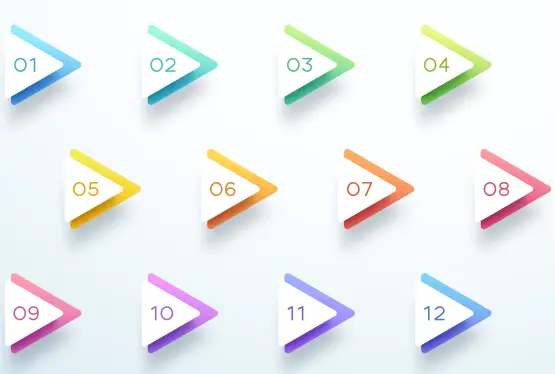| O, o (noun) | the fifteenth letter of the alphabet. |
| o’clock (adverb) | according to the clock (the movie starts at eight o’clock). |
| o’er (preposition) | (lit) over. |
| oaf (noun) | a stupid or clumsy person (the oaf painted the wrong door). |
| oak (noun) | a hardwood tree that bears acorns. |
| oar (noun) | a pole with a flat broad end, used for rowing a boat (he lost one of the oars). |
| oarlock (noun) | a U-shaped device on the side of a boat for keeping an oar in place. |
| oarsman (noun) | a rower (the oarsmen in the boat race). n oarsmanship |
| oasis (noun) | (pl oases ) a place in the desert where there is water and trees and plants grow. |
| oat (noun), oats (noun, plural) | a grain often used for food. |
| oatcake (noun) | a thin cake made of oatmeal (serve oatcakes with cheese). |
| oath (noun) | 1 a solemn promise, especially one made in God’s name (take the oath in court). 2 a swear word (object to his oaths in front of children). |
| oatmeal (noun) | oats ground to powder (take some oatmeal to make porridge). |
| obedient (adjective) | willing to do what you are told (obedient children/followers obedient to their leader). n obedience. |
| obeisance | Collective noun for servants (An obeisance of servants) (see list of collective nouns) |
| obelisk (noun) | a tall four-sided stone monument, narrowing to a point at its top. |
| obese (adjective) | (formal) very fat. n obesity |
| Obesophobia | fear of gaining weight (see list of phobias) |
| obey (verb) | 1 to do what you are told (when her mother tells her to do something, she obeys). 2 to carry out (obey instructions). |
| obituary (noun) | 1 a list of deaths. 2 a newspaper account of the life of a person who has recently died (an obituary of the famous poet). |
| object (noun) | 1 anything that can be perceived by the senses. 2 aim, purpose (his object is to make money quickly). 3 in grammar, a word governed by a verb or preposition. vb object 1 to express dislike. 2 to speak against. |
| objection (noun) | a reason against (raise objections against the proposed new road). |
| objectionable (adjective) | deserving to be disliked, unpleasant (a really objectionable young man). |
| objective (adjective) | not depending on, or influenced by, personal opinions (judges have to be objective). n aim, purpose (his objective is a job that he will enjoy). adv objectively |
| objector (noun) | a person who objects (objectors to the new road scheme). |
| obligation (noun) | 1 a duty, a promise that must be kept (he is under an obligation to support his children). 2 gratitude due to another for kindness or help. |
| obligatory (adjective) | that has to be done (e.g. as a duty), compulsory (attendance at the meeting is obligatory). |
| oblige (verb) | 1 (formal) to force or make it necessary to do (she was obliged to stop working because of ill health). 2 to do a kindness to or service for (could you oblige us by lending us your lawnmower?). |
| obliging (adjective) | ready to help, kind (obliging neighbors). |
| oblique (adjective) | 1 slanting (an oblique line). 2 indirect, roundabout (an oblique reference to his dishonesty). |
| obliterate (verb) | 1 to destroy utterly (a town obliterated by enemy bombs). 2 to blot out (snow obliterating the footprints in the mud). n obliteration |
| oblivion (noun) | 1 the state of being unaware, forgetfulness (in total oblivion of what had happened). 2 the state of being forgotten (he used to be famous but after his death his name sank into oblivion). |
| oblivious (adjective) | unaware of, not paying attention to (completely oblivious to what was happening around him). |
| oblong (noun) | 1 a four-sided figure with all angles right angles and one pair of sides longer than the other pair. 2 a figure or object so shaped. adj having this shape. |
| obnoxious (adjective) | very unpleasant, hateful (obnoxious people/obnoxious smells). |
| oboe (noun) | a wooden wind instrument. n oboist |
| obscene (adjective) | disgusting, indecent (obscene passages in the film had to be removed). adv obscenely n obscenity |
| obscure (adjective) | 1 (formal) dark (an obscure corner of the room). 2 not clear in meaning (an obscure reference to an earlier work). 3 not well-known, not famous (an obscure poet). vb 1 to darken. 2 to hide from view. 3 to make more difficult. |
| obscurity (noun) | the state of being obscure (a once-famous poet now in obscurity). |
| observance | Collective noun for hermits (An observance of hermits) (see list of collective nouns) |
| observance (noun) | 1 the act of observing (the observance of religious holidays). 2 the act of obeying (the observance of the law). |
| observant (adjective) | quick to notice things (not observant enough to take the license number of the car). |
| observation (noun) | 1 the act, power, or habit of observing (the police officer’s observation of the criminal’s activities). 2 a remark (he made the observation that things were going badly for the President). |
| observatory (noun) | a place from which scientists study the stars, the planets, and the heavens. |
| observe (verb) | 1 (formal) to see, to notice (observe a change in the weather). 2 to watch carefully (police told to observe the movements of the accused). 3 to carry out (observing local customs). 4 to say, to make a remark (he observed that the weather was mild for the time of year). |
| observer (noun) | 1 a person who observes. 2 a person whose job it is to take careful notice of what is going on. |
| obsess (verb) | to take up all your thoughts and interest (obsessed by her rival’s activities). adj obsessive |
| obsession (noun) | an idea or interest that takes up all your attention so that you never think of other things. |
| obsolete (adjective) | no longer in use, out of date (obsolete computer). |
| obstacle (noun) | that which is in the way and prevents progress (lack of money was an obstacle to the firm’s plans for expansion). |
| obstacle race (noun) | a race in which the runners have to find their way under, over, or through certain objects placed on the course to hinder them. |
| Obstetrics | study of midwifery (see list of branches of science) |
| obstinate (adjective) | 1 determined to hold to your own opinions, etc; stubborn. 2 not easy to cure or remove (an obstinate stain). n obstinacy |
| obstruct (verb) | 1 to stop up. 2 to prevent from moving or acting freely. |
| obstruction (noun) | 1 a cause of delay. 2 an obstacle. |
| obstructive (adjective) | causing delay (obstructive tactics). |
| obtain (verb) | to get (interested in obtaining a share of the business). |
| obtainable (adjective) | that can be gotten (goods that are no longer obtainable). |
| obtuse (adjective) | 1 stupid, slow to understand (they accused him of being deliberately obtuse in not understanding the instructions). 2 (of an angle) greater than a right angle. |
| obvious (adjective) | easily seen or understood (an obvious solution to the problem). adv obviously |
| occasion (noun) | 1 a particular time (decide not to complain on this occasion). 2 a special event (the wedding was the occasion of the year for the family). 3 (formal) a reason (no occasion to be angry). 4 (formal) opportunity (if the occasion arises). vb to cause. |
| occasional (adjective) | 1 happening now and then (pay the occasional visit). 2 having to do with a particular event or occasion (occasional poems). adv occasionally |
| occult (adjective) | secret, mysterious, having to do with magic (occult powers/occult ceremonies). |
| occupancy (noun) | 1 act of going to live in a house (their occupancy of the new house). 2 the time during which you live there (an occupancy of five years). |
| occupant , occupier (noun) | the person living in a house (owner-occupiers). |
| occupation (noun) | 1 act of occupying (their occupation of the house oc-yu-pay-shnal/. |
| occupy (verb) | 1 to take possession of (a town occupied by the enemy). 2 to live in (he occupies the whole house). 3 to fill (occupying an important post). 4 to keep busy (she keeps herself occupied by doing voluntary work). 5 to take up (space, time, etc) (his collection of model trains occupies a whole room). |
| occur (verb) | (occurred , occurring ) 1 to happen (accidents occurring). 2 to come to the mind (it suddenly occurred to me who he was). 3 to be found here and there. |
| occurrence (noun) | a happening, an event (a daily occurrence). |
| ocean (noun) | 1 the vast body of salt water surrounding the land on the earth (on land or in the ocean). 2 a large sea (the Pacific Ocean). adj oceanic |
| Oceanography | study of oceans (see list of branches of science) |
| Oceanology | study of oceans (see list of branches of science) |
| ocelot (noun) | a spotted wildcat from southwestern United States, Central America and parts of South America. |
| Ochlophobia | fear of crowds or mobs (see list of phobias) |
| Ochophobia | fear of vehicles (see list of phobias) |
| octagon (noun) | a figure or shape with eight angles and sides. |
| octagonal (adjective) | eight-sided. |
| octave (noun) | 1 (music) a scale of eight notes beginning and ending with a note of the same tone but a different pitch. 2 a stanza of eight lines. |
| octet (noun) | a piece of music for eight singers or instruments. |
| October (noun) | the tenth month of the year, following September (Hallowe’en is October 31). |
| octogenarian (noun) | a person who is 80 years old or between 80 and 90. |
| Octophobia | fear of the figure 8 (see list of phobias) |
| octopus (noun) | a sea creature with eight tentacles. |
| odd (adjective) | 1 (of a number) not even, that cannot be divided by 2 without leaving a remainder of 1 (9 is an odd number). 2 strange, unusual (an odd character od-lee/. |
| oddity (noun) | something strange or unusual, a strange person (he’s a bit of an oddity). |
| oddment (noun) | a piece left over (oddments of material). |
| odds (noun, plural) | the chances in favor of a certain happening or result (the odds are that he will win). at odds with on bad terms with (two branches of the firm at odds with each other). make no odds make no difference (it makes no odds how many people come—we have plenty of room). odds and ends extra pieces or things of various kinds (go shopping for some odds and ends). |
| ode (noun) | a poem in which the writer expresses his or her ideas or feelings on a certain subject at some length (Keats’s “Ode to Autumn”). |
| odious (adjective) | hateful, disgusting (an odious smell/an odious man). |
| odium (noun) | (formal) hatred, widespread dislike or blame (bring odium on his family). |
| Odonatology | study of dragonflies and damselflies (see list of branches of science) |
| Odontology | study of teeth (see list of branches of science) |
| Odontophobia | fear of teeth or dental surgery (see list of phobias) |
| odor (noun), | also odour (British spelling) any smell, pleasant or unpleasant (the odor of a fish in the boat). |
| odorless adj, also odourless (British spelling) | having no smell (odorless face creams). |
| odorous (adjective) | having a smell, especially a characteristic one (the odorous smell of lilies). |
| Odynephobia | fear of pain (see list of phobias) |
| Odynophobia | fear of pain (see list of phobias) |
| odyssey | Collective noun for luggage (An odyssey of luggage) (see list of collective nouns) |
| odyssey (noun) | (lit) a long adventurous journey. |
| Oenology | study of wines (see list of branches of science) |
| Oenophobia | fear of wines (see list of phobias) |
| oesophagus | see esophagus. |
| of prep1 | belonging to (the shore of the lake). 2 relating to (a tale of the Wild West). 3 made of (a band of gold). 4 from (south of the border). |
| off (adverb) | 1 away (they drove off). 2 distant (a few miles off). adj 1 not happening (the match is off). 2 (informal) not fit to eat, bad, rotten (this meat is off). (preposition) away from, not on (keep off the grass/take your foot off the table. |
| offal (noun) | the inner organs of an animal, sold as food or regarded as waste matter (offal such as heart and liver). |
| offence | see offense |
| offend (verb) | 1 to displease, to hurt someone’s feelings (she was offended at not being asked to their party). 2 (formal) to do wrong (offend against society). 3 to be unpleasant or disagreeable (his bad language offended her). |
| offender (noun) | 1 a person who does wrong (a first offender who was not sent to prison). 2 a person who causes offense. |
| offense (noun), | also offence (British spelling) 1 a wrongful act (it’s an offense to drive in the dark without lights). 2 hurt done to the feelings, a feeling that you have been insulted (a remark that gave offense to his family). 3 those players in a sports team whose job is to score goals. |
| offensive (adjective) | 1 unpleasant (an offensive smell/an offensive person). 2 insulting (an offensive remark). 3 having to do with attack (offensive weapons). n an attack (the army took the offensive). |
| offer (verb) | 1 to give someone the chance of taking (offer him a job). 2 to say that you are willing (to do something) (to offer to help). 3 to give as a sacrifice (offer a lamb to God). n 1 act of offering. 2 the thing or amount offered (an offer of $250,000 for their house). |
| offering (noun) | 1 (fml or hum) a gift (a humble offering). 2 (old) that which is sacrificed to God. 3 a sum of money given at a religious service, used for the work of the church. |
| offhand (adjective) | careless, thoughtless (his offhand treatment of others). |
| office (noun) | 1 a special duty. 2 a job, especially one in the service of the public (the office of mayor/the political party in office). 3 a room or building in which business is carried on (the head office of the company). 4 (formal) an act of kindness (thanks to his good offices). |
| officer (noun) | a person who holds a post with certain powers or duties, especially in the armed forces (an army officer). |
| official (adjective) | 1 having to do with an office or the duties attached to it (his official tasks). 2 given out or announced by those with the right to do so (receive official permission). n a person who holds a post with certain powers or duties. adv officially |
| officialdom (noun) | 1 all those holding public office. 2 an unbending attitude of holding to regulations and routine (thanks to officialdom, her visa took weeks to come through). |
| off-peak (adjective) | happening when, for example, the city is less busy (buy an off-peak travel ticket). |
| off-putting (adjective) | discouraging. |
| offset (verb) | (offset, offsetting) to make up for (her enthusiasm offsets her lack of training). |
| offshoot (noun) | 1 a branch or shoot growing out from the main stem of a plant. 2 something growing out of something else (the firm is an offshoot of a large business). |
| offshore (adjective) | toward the sea. adv offshore. |
| offside (adverb) | and adj in soccer or hockey, in a position disallowed by the rules when the ball was last kicked or struck. |
| offspring (noun) | a child or children (the couple have badly behaved offspring). |
| often (adverb) | frequently (we often see them). |
| ogle | Collective noun for office boys (An ogle of office boys) (see list of collective nouns) |
| ogle (verb) | to look sidewise at, to look or stare at because of admiration or physical attraction. |
| ogre (noun) | in fairy tales, a man-eating giant. f ogress |
| ohm (noun) | the unit of measurement of electrical resistance. |
| Oikology | study of housekeeping (see list of branches of science) |
| Oikophobia | fear of home surroundings and household appliances (see list of phobias) |
| oil (noun) | a greasy liquid obtained from vegetable, animal, or mineral sources, and used as a food, fuel, lubricant, etc (put more oil in the car engine oilz/ oil paints or painting (a portrait in oils). vb to put or drop oil on, as on the parts of a machine, to make them work smoothly (oil the hinges of the gate). |
| oil painting (noun) | a picture done in oils (an oil painting of their house). |
| oilskin (noun) | a cloth made waterproof with oil. |
| oily (adjective) | 1 covered with oil (oily hands). 2 greasy (oily food). |
| ointment (noun) | an oily paste rubbed on the skin to heal cuts or sores. |
| OK (adverb) | and adj (informal) all right. |
| old (adjective) | 1 not new (old clothing). 2 aged (old people). 3 belonging to the past (old customs). 4 not fresh (old bread). |
| olden (adjective) | of former times (in the olden days). |
| old-fashioned (adjective) | out of date (old-fashioned clothing). |
| Olfactology | study of the sense of smell (see list of branches of science) |
| Olfactophobia | fear of smells (see list of phobias) |
| olive (noun) | 1 an evergreen tree bearing a small, sharp-tasting fruit, from which oil can be obtained. 2 its fruit, used as food (olives stuffed with peppers). adj yellowish-green. n olive oil. |
| olive branch (noun) | a sign of peace (we hadn’t spoken to our neighbors for years but we decided to hold out an olive branch to them). |
| olive-skinned (adjective) | having a yellowish-brown skin (olive-skinned people). |
| Olympic (adjective) | having to do with Olympia in Greece, and the games held there every four years in ancient times. |
| Olympic Games (noun) | an international athletic contest held every four years, each time in a different country. |
| Ombrology | study of rain (see list of branches of science) |
| Ombrophobia | fear of rain or of being rained on (see list of phobias) |
| omelet (noun), | also omelette eggs beaten and fried in a pan. |
| omen (noun) | a sign of a future event, good or bad (clouds are an omen of bad weather). |
| ominous (adjective) | signifying future trouble or disaster (ominous black clouds). |
| omit (verb) | (omitted , omitting ) 1 to fail to do (omit to post the letters). 2 to leave out (omit a few passages from the report). n omission |
| omitting | Collective noun for censors (An omitting of censors) (see list of collective nouns) |
| Ommatophobia | fear of eyes (see list of phobias) |
| Ommetaphobia | fear of eyes (see list of phobias) |
| omnibus (noun) | 1 (formal) a bus. 2 a book containing several works by the same author or on the same subject (an omnibus edition of the crime writer’s works). |
| omnivorous (adjective) | (fml or hum) eating all kinds of food (omnivorous animals). |
| Omphalophobia | fear of belly buttons (see list of phobias) |
| on (adverb) | 1 being worn (put your shoes on). 2 forward (they walked on). adj in operation (the TV is on). (preposition) on top of (on the table). |
| once (adverb) | 1 on one occasion only (I met him only once). 2 formerly (they were friends once). once and for all once and never again (they told her once and for all to go). at once immediately (I shall come at once). |
| Oncology | study of tumours (see list of branches of science) |
| oncoming (adjective) | approaching (oncoming traffic). |
| one (adjective) | single. pron a person. n the number 1. |
| Oneirogmophobia | fear of wet dreams (see list of phobias) |
| Oneirology | study of dreams (see list of branches of science) |
| Oneirophobia | fear of dreams (see list of phobias) |
| one-sided (adjective) | favoring one party or point of view only (giving a one-sided version of events). |
| one-way (adjective) | of a street, allowing movement of traffic in one direction only. |
| ongoing (adjective) | continuing, continuing to develop (an ongoing process). |
| onion (noun) | a strong-smelling edible bulb, often used in cooking. |
| online (adjective/adverb) | controlled by or connected to a central computer or connected to the Internet. |
| onlooker (noun) | a spectator, a person who looks at what is happening but takes no part in it (police asked the onlookers to move from the scene of the accident). |
| only (adverb) | no more than (only two days). (conjunction) except that (I would love to take a vacation, only I can’t afford it). |
| only child (noun) | a person who has no brothers or sisters. |
| Onomasiology | study of nomenclature (see list of branches of science) |
| Onomastics | study of proper names (see list of branches of science) |
| Onomatophobia | fear of hearing a certain word or of names (see list of phobias) |
| onomatopoeia (noun) | forming words by imitating sounds (e.g. hiss, bang). adj onomatopoeic |
| onrush (noun) | a rapid advance (the onrush of the protesting demonstrators). |
| onset (noun) | the first attack of or the beginning of (the onset of the illness). |
| onshore (adjective) | toward the shore. adv onshore |
| onslaught (noun) | a fierce attack (try to withstand the enemy onslaught/a politician making an onslaught on the government). |
| Ontology | study of pure being; the nature of things (see list of branches of science) |
| onward (adjective) | forward. adv onward |
| onyx (noun) | a precious stone containing layers of different colors. |
| Oology | study of eggs (see list of branches of science) |
| ooze | Collective noun for amoebas (An ooze of amoebas) (see list of collective nouns) |
| ooze (noun) | soft mud, slime. vb 1 to flow very slowly (blood oozing from the wound). 2 to have flowing from (a wound oozing pus). |
| opacity | see opaque. |
| opal (noun) | a white precious stone that changes color when turned in the light. |
| opaque (adjective) | that cannot be seen through, letting no light through (opaque glass). n opacity |
| open (adjective) | 1 not shut, uncovered (an open gate). 2 ready for business (the stores are open). 3 not hidden (an open show of affection). 4 free from obstructions (the road is open now). 5 public (an open meeting). 6 sincere (an open manner). 7 clear. vb 1 to make or become open (open the door). 2 to unlock (open the safe). 3 to begin (open the meeting). in the open air outside. keep open house to welcome all visitors. open up to build roads, etc, in a country to make progress possible. |
| open-handed (adjective) | (formal) generous (an open-handed host). |
| opening (noun) | 1 beginning (the opening of the fête). 2 a gap, a way in or out (an opening in the fence). 3 an opportunity (job openings). |
| openly (adverb) | publicly, not secretly (discuss the matter openly). |
| open-minded (adjective) | ready to consider new ideas, unprejudiced. |
| opera | Collective noun for canaries (An opera of canaries) (see list of collective nouns) |
| opera glasses (noun, plural) | glasses used in the theater to magnify the stage and players. |
| opera1 (noun) | a musical drama in which all or some of the words are sung (operas by Wagner). |
| opera2 | see opus. |
| operate (verb) | 1 (of a machine) to work or to cause to work (machines operated by hand). 2 (of a surgeon) to cut the body in order to cure or treat a diseased part (operating to remove her appendix). |
| operatic (adjective) | having to do with opera (operatic tenors). |
| operating system (noun) | the software that controls the operation of a computer. |
| operation (noun) | 1 action (a rescue operation/a plan now in operation). 2 the way a thing works (the operation of the machine). 3 the cutting of the body by a doctor or surgeon to cure or treat a diseased or injured part (an operation to remove tonsils). |
| operative (adjective) | 1 in action. 2 having effect. n a worker in a factory. |
| operator (noun) | a person who looks after a machine (the elevator operator). |
| operetta (noun) | a short, not too serious, musical play (an operetta by Gilbert and Sullivan). |
| Ophidiophobia | fear of snakes (see list of phobias) |
| Ophiology | study of snakes (see list of branches of science) |
| ophthalmic (adjective) | having to do with the eye(s). |
| Ophthalmology | study of eye diseases (see list of branches of science) |
| Ophthalmophobia | fear of being stared at (see list of phobias) |
| opinion (noun) | 1 that which you think or believe about something (listen to the opinions of others). 2 judgment (too ill to work, in the doctor’s opinion). |
| opinionated , opinionative (adjective) | sure that your opinions are correct (an opinionated young woman who refuses to listen to the advice of others). |
| Opiophobia | fear of prescribing (opioid) medication to patients (see list of phobias) |
| opium (noun) | a sleep-producing drug made from poppy seeds. |
| opossum (noun) | a small animal that carries its young in a pouch. |
| opponent (noun) | an enemy, a person whom you try to overcome in a game, argument, etc (his opponent in the tennis match). |
| opportune (adjective) | happening at the right time (arrive at the opportune moment). |
| opportunist (noun) | a person who takes advantage of opportunities that occur). adj opportunistic. |
| opportunity (noun) | happening at the right time (arrive at the opportune moment). |
| oppose (verb) | 1 to act or speak against (opposing the bill in Parliament). 2 to resist (oppose change). |
| opposite (adjective) | 1 facing (the house opposite). 2 in the same position on the other side. 3 different in every way (have opposite tastes in music/go in opposite directions). n something in every way different (“good” is the opposite of “bad”). adv across from. |
| opposition (noun) | 1 the act of going or speaking against, resistance (their opposition to the new road). 2 (often cap) in politics, the party that criticizes or resists the governing party (leader of the Opposition). |
| oppress (verb) | 1 to govern harshly or unjustly, to treat cruelly (a tyrant who oppressed the people). 2 to make gloomy or anxious (oppressed by news of the war). n oppression |
| oppressive (adjective) | 1 harsh and unjust (an oppressive form of government). 2 (of the weather) hot and tiring. |
| opt (verb) | to choose (I opted for the rack of lamb). opt out to choose not to do something. |
| optic , optical (adjective) | having to do with sight or the eye(s). |
| optician (noun) | a person who makes or sells glasses for the eyes (an appointment at the optician’s for an eye test). |
| Optics | study of light (see list of branches of science) |
| optics (noun) | the science of light or sight. |
| optimal (adjective) | best (the optimal time). |
| optimism | Collective noun for youths (An optimism of youths) (see list of collective nouns) |
| optimism (noun) | the belief that all that happens is for the best, cheerful hope that all will go well (they were full of optimism although we thought they had little chance of success). |
| optimist (noun) | a cheerfully hopeful person. |
| optimistic (adjective) | having to do with or characterized by optimism (optimistic people op-ti-mi-sti-clee/. |
| optimum (adjective) | and n best. |
| option (noun) | choice (no option but to go). |
| optional (adjective) | that may or may be done or not, by choice (some school subjects are optional). |
| Optology | study of sight (see list of branches of science) |
| Optophobia | fear of opening one’s eyes (see list of phobias) |
| opulence (noun) | (formal) riches, wealth (the opulence of the king). |
| opulent (adjective) | (formal) rich, wealthy. |
| opus (noun) | (pl opuses or opera ) 1 (formal) a work of art (the latest opus of the author). 2 a musical work numbered in order of composition (Beethoven’s opus 106). |
| or (conjunction) | used to link alternatives (would you like milk or OJ?) |
| oracle (noun) | 1 in legend, the answer given to a question by or on behalf of a god. 2 the place where such answers were given. 3 a person who answers on behalf of a god. 4 (often hum) a wise or knowledgeable person (she is the oracle on company law in the office). |
| oral (adjective) | spoken, not written (an oral exam). adv orally |
| orange (noun) | 1 a juicy fruit with a reddish-yellow skin (peel the rind from an orange). 2 the tree bearing it. 3 its color, reddish-yellow. adj of orange color. |
| orangutan (noun) | a large man-like ape with long arms. |
| oration (noun) | (formal) a formal public speech (a funeral oration). |
| orator (noun) | a skilled public speaker (an eloquent orator). |
| orb (noun) | (lit) a sphere, a round object. |
| orbit | Collective noun for ophthalmologists (An orbit of ophthalmologists) (see list of collective nouns) |
| orbit | Collective noun for satellites (An orbit of satellites) (see list of collective nouns) |
| orbit (noun) | the curved path of a planet, comet, rocket, etc, around a larger heavenly body (a satellite in orbit around the earth). adj orbital |
| orchard | Collective noun for apple trees (An orchard of apple trees) (see list of collective nouns) |
| orchard | Collective noun for fruit trees (An orchard of fruit trees) (see list of collective nouns) |
| orchard (noun) | a field in which fruit trees are grown (an apple orchard). |
| orchestra | Collective noun for crickets (An orchestra of crickets) (see list of collective nouns) |
| orchestra (noun) | 1 a group of musicians skilled in different instruments who play together (she plays the flute in the orchestra). 2 the place where they sit in a hall or theater. |
| orchestral (adjective) | suitable for performance by an orchestra (orchestral music). |
| orchestrate (verb) | 1 to arrange for an orchestra (orchestrating the music). 2 to organize or arrange (orchestrate the campaign). n orchestration |
| orchid (noun) | a showy flower with unusually shaped petals. |
| Orchidology | study of orchids (see list of branches of science) |
| ordain (verb) | 1 (formal) to order (prisoners freed as the king ordained). 2 to admit to office as a priest or minister of religion. |
| ordeal (noun) | a difficult, painful experience (being taken hostage was a terrible ordeal). |
| order (noun) | 1 a methodical arrangement (put the books in order). 2 a command (obey the officer’s order). 3 rank, class (the various orders of plants). 4 obedience to law (law and order). 5 tidiness (lack of order in the room). 6 an instruction to make or supply something (an order for books). 7 a body or brotherhood of people of the same rank, profession, etc; a religious brotherhood obeying a certain rule (an order of monks). vb 1 to arrange (order the book alphabetically). 2 to command (order them to leave). 3 to give an instruction to make or supply (orders books from them). |
| orderly (adjective) | 1 tidy, well-arranged (an orderly room). 2 well-behaved (an orderly group of children). n 1 a soldier who carries the orders and messages of an officer. 2 a hospital attendant. |
| ordinal (adjective) | showing the place in an order (first, second, third, etc, are ordinal numbers). |
| ordinance (noun) | (formal) a law, a command (obey the king’s ordinance). |
| ordinary (adjective) | usual, common, not exceptional (an ordinary working day). adv ordinarily |
| ordination (noun) | the act or ceremony of admitting to office as a priest or minister of religion. |
| ore (noun) | rock from which metal is obtained (iron ore). |
| oregano (noun) | the dried leaves of the herb marjoram, used in cooking. |
| organ (noun) | 1 part of an animal or plant that serves some special purpose (the respiratory organs). 2 a large musical instrument supplied with wind through pipes and played by a keyboard (play the church organ). 3 a means of conveying views or information to the public (e.g. a newspaper) (the organ of the political party). |
| organic (adjective) | 1 having to do with an organ (an organic disorder). 2 produced by living organs (organic compounds). 3 grown without the use of artificial fertilizers (organic vegetables). adv organically |
| organism (noun) | 1 any living thing (all the organisms in a pond). 2 anything in which the parts all work together to serve one purpose. |
| organist (noun) | a person who plays the organ. |
| organization (noun) | also organisation (British spelling) 1 orderly arrangement (try to establish some organization in the office system). 2 a group of people working systematically to carry out a common purpose (a business organization). adj organizational , also organisational (British spelling) |
| organize (verb), | also organise (British spelling) 1 to put together in an orderly way, to make to work systematically (organizing the office filing system). 2 to arrange (organize a party). n organizer , also organiser (British spelling) |
| Organology (biology) | study of form, structure, development, and functions of plant or animal organs (see list of branches of science) |
| Organology (musicology) | study of musical instruments in relation to history, culture, construction, acoustic properties and classification (see list of branches of science) |
| orgy | Collective noun for swingers (An orgy of swingers) (see list of collective nouns) |
| orgy (noun) | a wild or drunken feast (have an orgy while his parents are away). |
| Orient (noun) | the East. |
| orient (verb) | to orientate. |
| oriental (adjective) | Eastern, Asian. n a native of an Eastern or Asian country. |
| Orientalist (noun) | a person who studies Eastern languages. |
| orientate (verb) | 1 to find out north, south, east, and west from the point where you are standing (the climbers were lost in the mist and tried to orientate themselves). 2 to arrange or direct toward (a course orientated to adult learners). n orientation |
| orienteering (noun) | the sport of following a route on foot as quickly as possible, using a map and compass. |
| orifice (noun) | (formal) an opening (bodily orifices). |
| origami (noun) | the Japanese art of paper-folding. |
| origin (noun) | 1 the place or point at which a thing begins; the beginning (the origin of the river/the origin of the word). 2 the cause (the origin of his problem). |
| original (adjective) | 1 new, not thought of before (an original idea). 2 first in order (the original inhabitants of the country). 3 ready to think or act in a new way (an original thinker). 4 not copied (an original painting). n 1 an original work of art, etc. 2 a creative or eccentric person. adv originally |
| originality (noun) | the ability to think or act in a new way. |
| originate (verb) | 1 to bring into being (originating a new club). 2 to come into being (a sport that originated in China). |
| oriole (noun) | a bird with golden-yellow feathers. |
| ornament (noun) | that which decorates or makes more attractive. vb ornament to decorate. n ornamentation |
| ornamental (adjective) | decorative (fireplaces that are purely ornamental). |
| ornate (adjective) | with a great deal of ornament, richly decorated (ornate furniture). |
| Ornithology | study of birds (see list of branches of science) |
| ornithology (noun) | the study of birds. n ornithologist (noun) a person who studies birds (ornithologists going on a bird-watching trip). |
| Ornithophobia | fear of birds (see list of phobias) |
| Orology | study of mountains (see list of branches of science) |
| orphan (noun) | a child whose parents are dead (made an orphan by the plane crash). vb to cause to become an orphan. Also adj. |
| orphanage (noun) | a home for orphans. |
| orthodontist (noun) | a dentist who straightens teeth. |
| orthodox (adjective) | 1 having the same beliefs or opinions as most other people (orthodox people). 2 agreeing with accepted belief (orthodox views). n orthodoxy |
| Orthoepy | study of correct pronunciation (see list of branches of science) |
| Orthography | study of spelling (see list of branches of science) |
| orthopedic adj, also orthopaedic (British spelling) | having to do with injury or diseases of the bones or joints (an orthopedic surgeon). |
| Orthophobia | fear of property (see list of phobias) |
| Orthopterology | study of cockroaches (see list of branches of science) |
| Oryctology | study of fossils , minerals , and rocks (see list of branches of science) |
| Osmics | study of smells (see list of branches of science) |
| Osmology | study of smells and olfactory processes (see list of branches of science) |
| Osmophobia | fear of smells or odors (see list of phobias) |
| Osphresiology | study of the sense of smell (see list of branches of science) |
| Osphresiophobia | fear of smells or odors (see list of phobias) |
| osprey (noun) | a hawk that feeds on fish. |
| ostensible (adjective) | as far as can be seen, apparent (his ostensible reason for leaving). adv ostensibly |
| ostentatious (adjective) | showy, fond of display (an ostentatious wedding despite their lack of money). |
| Osteology | study of bones (see list of branches of science) |
| osteopath (noun) | a person who practices osteopathy (he attended an osteopath for his backache). |
| osteopathy (noun) | the cure of pain or disease by massage or otherwise manipulating the bones. |
| ostracize (verb), | also ostracise (British spelling) to drive out of society; to refuse to have anything to do with (workers ostracizing people who worked during the strike). n ostracism |
| Ostraconophobia | fear of shellfish (see list of phobias) |
| ostrich (noun) | a large swift-running bird valued for its feathers. |
| other (adjective) | 1 one of two things (the other hand). 2 additional (we have other problems). 3 not mentioned, present, etc (other people). |
| otherwise (adverb) | 1 in a different way (they think otherwise). 2 if this were not so (you must pay—otherwise they will sue you). |
| Otology | study of the ear (see list of branches of science) |
| Otorhinolaryngology | study of ear, nose and throat (see list of branches of science) |
| otter (noun) | a fish-eating animal of the weasel family. |
| ottoman (noun) | a sofa without back or arms. |
| ought (verb) | should (she ought to see a doctor). |
| ounce (noun) | 1 in the imperial system, a unit of weight (1/16 of a pound). 2 a small amount (she has not an ounce of common sense). |
| our (adjective) | belonging to us. pron (possessive) ours , ourselves |
| Ouranophobia | fear of heaven (see list of phobias) |
| oust (verb) | to put out; to drive out (ousted from his post). |
| out (adverb) | 1 not inside (the children are out in the garden). 2 away (he was told to get out). (preposition) out of, out through, outside. adj 1 external. 2 asleep or unconscious (out to the world). |
| out of date (adjective) | old-fashioned (his car was very out of date/she wore out-of-date clothing). |
| out-and-out (adjective) | thorough (an out-and-out villain). |
| outback | Collective noun for Aussies (An outback of Aussies) (see list of collective nouns) |
| outback (noun) | a remote area of Australia with very few inhabitants. |
| outbid (verb) | to offer a higher price than another (she outbid him for the antique furniture). |
| outboard (adjective) | attached to the outside of a boat (an outboard motor). |
| outbreak (noun) | a sudden beginning, a breaking out (the outbreak of war). |
| outburst (noun) | a bursting out, an explosion (an outburst of applause/an outburst of anger). |
| outcast (adjective) | driven away from your home and friends. n a person who is so driven away (an outcast from society). |
| outcome (noun) | the result (the outcome of the discussion). |
| outcrop (noun) | a layer of rock that shows above the surface of the earth. |
| outcry (noun) | widespread complaint (there was an outcry at the closure of the bridge). |
| outdated (adjective) | old-fashioned, out of date (outdated ideas about child care). |
| outdo (verb) | to do better than (his rival tried to outdo him in giving her expensive presents). |
| outdoor (adjective) | done in the open air (an outdoor display). |
| outdoors (adverb) | in the open air (have lunch outdoors). Also n. |
| outer (adjective) | 1 farther out (outer space). 2 outside (the outer layer of clothing). |
| outer space (noun) | space beyond the earth’s atmosphere. |
| outermost (adjective) | farthest out (the outermost ring of a target). |
| outfield (noun) | the part of a baseball field that extends outward from the diamond. n outfielder |
| outfit (noun) | 1 all the articles necessary for a certain job (a bicycle repair outfit). 2 a set of articles of clothing (buy a new outfit for the wedding). |
| outgoings (noun, plural) | the money spent (their outgoings came to more than their income). |
| outgrow (verb) | 1 to grow taller than (he has outgrown his elder brother). 2 to grow too big or too old for (children outgrowing their clothing). |
| outing (noun) | a short trip made for pleasure (take the children on an outing to the shore). |
| outlast (verb) | to last longer than. |
| outlaw (noun) | (old) someone whose person and property are no longer protected by the law (Billy the Kid was an outlaw). vb 1 to declare an outlaw. 2 to declare not legal (the authorities want to outlaw drinking and driving). |
| outlet (noun) | 1 an opening outward (an outlet from the main water tank). 2 an activity that allows you to make use of your powers or of a particular ability (playing in the youth orchestra was an outlet for his musical talent). |
| outline (noun) | 1 a line showing the shape of a thing (she tried to draw an outline of the building). 2 an account of the most important points, etc. vb 1 to draw in outline. 2 to describe without giving details (at the meeting the directors outlined the company’s plans for expansion). |
| outlive (verb) | to live longer than (he outlived his son). |
| outlook (noun) | 1 a view (a house with a beautiful outlook). 2 what seems likely to happen in future (the financial outlook for the firm is not good). 3 a point of view (a gloomy outlook on life). |
| outmoded (adjective) | out of fashion (outmoded ideas). |
| outnumber (verb) | to be greater in number than (the children outnumbered the adults). |
| outpatient (noun) | a person who visits a hospital for treatment but does not stay there overnight (he attended the hospital as an outpatient). |
| outpost (noun) | 1 a defended place close to enemy territory and in front of the main positions. 2 a settlement far from towns and main roads (the last outpost of civilization). |
| output (noun) | the total amount produced by a machine, factory, worker, etc (increase output by 10%). |
| outrage (noun) | 1 a violent and wicked deed (outrages committed by enemy soldiers). 2 a deed that shocks or causes widespread anger (he regarded the decision to cut workers’ wages as an outrage). vb 1 to cause anger or resentment. 2 to seriously offend or insult. adj outrageous |
| outrider (noun) | person who rides on horseback or on a motorcycle beside or in front of a vehicle (he traveled by car with police outriders). |
| outright (adverb) | 1 completely and at once (they paid for the furniture outright/kill him outright). 2 openly, frankly (tell me outright what you feel). adj complete (an outright refusal). |
| outrun (verb) | to run faster than (outrun the other horses in the race). |
| outset (noun) | beginning (realized the plan was a failure from the outset). |
| outside (noun) | 1 the outer part or parts (the outside of the orange). 2 the part farthest from the center (standing on the outside of the group). adj 1 being on the outside, external (outside help). 2 outdoor (an outside hot tub). 3 slight (an outside chance). adv on or to the outside. (preposition) on or to the exterior of, beyond. |
| outsider (noun) | 1 a person who is not accepted as a member of a certain group (still regarded as an outsider by the family although she is married to one of the sons). 2 a person who is believed to have little chance of winning (a horse regarded as an outsider won the race). |
| outskirts (noun, plural) | the parts of a town or city farthest from the center (live on the outskirts of the city). |
| outsmart (verb) | to outwit someone (the fox outsmarted the hunters). |
| outspoken (adjective) | saying just what you think, frank (outspoken people stating their objections). |
| outstanding (adjective) | 1 exceptionally good (an outstanding student/an outstanding performance). 2 (formal) still in existence (outstanding debts). |
| outward (adjective) | 1 on the outside or surface (her outward cheerfulness). 2 away from a place (the outward journey). adv outward, outwardly |
| outwit (verb) | to outdo or overcome by greater cleverness, to deceive (succeed in outwitting the police). |
| ova | see ovum. |
| oval (adjective) | egg-shaped (an oval face). n an oval shape or figure. |
| ovary (noun) | 1 a bodily organ in which eggs are formed (a woman’s ovaries). 2 the seed case of a plant. |
| ovation (noun) | enthusiastic applause (a standing ovation). |
| oven (noun) | a small chamber heated by a fire or stove and used for cooking (an electric oven). |
| over (preposition) | 1 above (a picture over the mantel). 2 across (jump over the wall). 3 more than (over three miles). adv 1 above (planes flying over). 2 across (water boiling over). 3 from one side to the other or another (roll over). 4 more than the quantity assigned (food left over). 5 completed (it’s all over). 6 from beginning to end (think it over). |
| overalls (noun, plural) | a garment worn over your usual clothing to keep it clean (workers wearing overalls). |
| overawe (verb) | to frighten into obeying or being silent, to fill with silent respect (children overawed by the great man). |
| overbalance (verb) | 1 to lean too much in one direction and fall (the tightrope walker overbalanced). 2 to cause to fall in this way. |
| overbearing (adjective) | proud and commanding (overbearing people who try to bully others). |
| overboard (adverb) | over the side of a ship (fall overboard). |
| overcast (adjective) | clouded over (an overcast sky). |
| overcharge | Collective noun for repairmen (An overcharge of repairmen) (see list of collective nouns) |
| overcharge (verb) | to ask for too great a price (he was overcharging customers). |
| overcoat (noun) | a warm outer garment (wear an overcoat over his suit). |
| overcome (verb) | 1 to defeat (overcome the enemy). 2 to get the better of (overcome difficulties). |
| overdo (verb) | 1 to do too much (the invalid was told not to overdo it). 2 to cook for too long (overdo the steak). |
| overdose (noun) | too large a dose (take an overdose of the drug, intending to commit suicide). Also vb. |
| overdraft (noun) | the amount of money drawn from a bank in excess of what is available in an account (try to pay off their overdraft). |
| overdraw (verb) | to take more from a bank than you have in your account (overdraw his account). |
| overdress (verb) | to dress too well for the occasion (she felt overdressed since everyone else was wearing jeans and sweaters). |
| overdue (adjective) | after the time fixed or due. |
| overestimate (verb) | to set too high a value on (overestimating their ability). |
| overexpose (verb) | to expose a photographic film to too much light. |
| overflow (verb) | to flood, to flow over the edge or limits of (the river overflowed its banks). n 1 what flows over the sides (a pipe for the overflow). 2 the amount by which something is too much (another hall for the overflow of the audience). |
| overgrown (adjective) | grown beyond the normal size. |
| overhand (adjective) | something done with your arm raised above your shoulder (an overhand pitch). |
| overhaul (verb) | 1 to examine thoroughly and carry out necessary repairs (overhauling the car engine). 2 to catch up (overhaul the other runners). n overhaul |
| overhead (adjective/adverb) | in the sky, above (overhead cables). |
| overheads (noun, plural) | the costs of running a business (the overheads are too expensive). |
| overhear (verb) | to hear what you are not intended to hear (overhear his parents’ conversation). |
| overjoyed (adjective) | extremely happy. |
| overland (adverb) | across land (not sea) (journey overland). adj passing by land. |
| overlap (verb) | to cover partly and go beyond (tiles overlapping). |
| overleaf (adverb) | on the reverse side of a page (turn overleaf). |
| overload (verb) | to put too heavy a load on. |
| overlook (verb) | 1 to look down on from above (balconies overlooking the sea). 2 to forgive, to let off without punishment (overlook the children’s naughtiness). 3 not to notice, to miss (defects that are easily overlooked). |
| overnight (adverb) | during the night (have to stay overnight after the party). adj done in or lasting the night (an overnight journey). |
| overpower (verb) | to defeat by greater strength (succeed in overpowering the burglar). |
| overpowering (adjective) | too great to bear (an overpowering urge to scream). |
| overrate (verb) | to think a person or thing better than he, she, or it really is (he thinks the artist is overrated). |
| override (verb) | 1 to decide to pay no attention to (override their objections). 2 to take manual control of a system usually under automatic control. |
| overrule (verb) | to use your power to rule out the decision or judgment of another (the appeal court judge overruled the previous judgment). |
| overrun (verb) | 1 to spread over in large numbers (rats overran the building). 2 to continue beyond the expected time (the show overran). |
| overseas (adjective/adverb) | across the sea; abroad (go overseas to work). |
| oversee (verb) | (pt oversaw , pp overseen ) to direct the work of others (oversee production). n overseer |
| overshadow (verb) | 1 to make less happy (the threat of war overshadowed their celebrations). 2 to make seem less important (her achievements were overshadowed by those of her sister). |
| overshoot (verb) | (pt, pp overshot ) to go beyond before stopping (the plane overshot the runway). |
| oversight (noun) | a mistake, a failure to do something (their failure to invite her was an oversight). |
| oversleep (verb) | (pt, pp overslept )to sleep later than intended. |
| overstep (verb) | to go beyond the limits of (she overstepped her authority when she sent everyone home). |
| overt (adjective) | done or said openly, not hidden (their overt dislike of him). adv overtly |
| overtake (verb) | to catch up with and pass (the car overtook the truck). |
| overthrow (verb) | to defeat, to remove from power (overthrow the government). Also n. |
| overtime (noun) | time worked beyond the regular hours (be paid extra for overtime). Also adj and adv. |
| overture (noun) | 1 a proposal, an offer. 2 the music played by the orchestra before an opera, etc. |
| overturn (verb) | 1 to turn upside down (overturn the bucket). 2 to make fall, to defeat, to ruin. |
| overweight (adjective) | weighing more than the proper amount. n excess weight. |
| overwhelm (verb) | 1 to defeat utterly (overwhelm the enemy). 2 to overcome all your powers, to make feel helpless (overwhelmed by the volume of work). adj overwhelming adv overwhelmingly |
| overwork (verb) | to work too hard (many students tend to overwork for their exams). n too much work. |
| ovoid (adjective) | egg-shaped. |
| ovum (noun) | (pl ova ) an egg. |
| owe (verb) | 1 to be in debt to (owe his brother $100). 2 to be obliged to (someone), to feel grateful to (owe his parents a lot). owing to because of (canceled owing to bad weather). |
| owl (noun) | a night bird of prey. |
| owlet (noun) | a young owl. |
| own (adjective) | belonging to yourself. vb 1 to possess (they own a car). 2 (formal) to admit (she owned that she was guilty). n owner n ownership |
| ox (noun) | (pl oxen ) a bull or cow). npl oxen cattle. |
| oxidation (noun) | compounding with oxygen. |
| oxide (noun) | a compound of oxygen with another element. |
| oxidize, oxidise (verb) | to make unite with oxygen. |
| oxygen (noun) | a gas without color, taste, or smell that is present in air and water, and is necessary for all life. |
| oxygenate , oxygenize , also oxygenise (British spelling) vb | to mix with oxygen. |
| oxymoron (noun) | a figure of speech in which an adjective seems to contradict the noun it accompanies (e.g. busy idler). |
| oyster (noun) | an edible shellfish with a double shell in which pearls are sometimes found (oysters and champagne). |
| oyster-catcher (noun) | a bird of the seashore. |
| ozone (noun) | 1 a kind of colorless gas with a chlorine-like smell. 2 (informal) clean, bracing air as found beside the sea. |
| ozone layer (noun) | a layer of ozone in the stratosphere that absorbs ultraviolet rays from the sun. |
| |
|
|
|




























